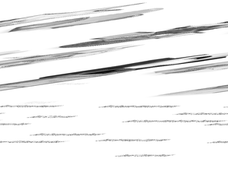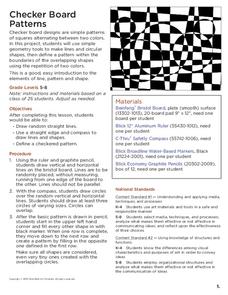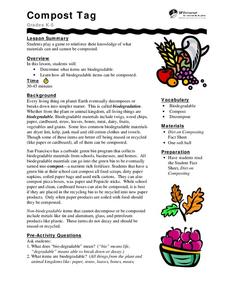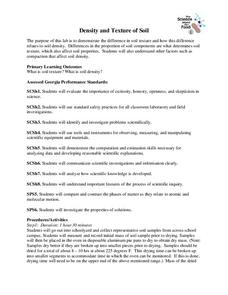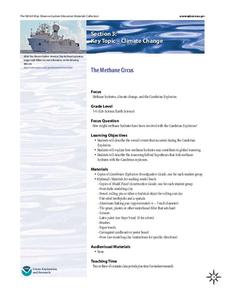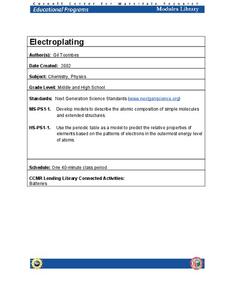Curated OER
Abstract Planes in Paper Sculpture
High schoolers create maquettes of abstract sculptures utilizing the elements of art; line, shape, value, color, space and texture and the principles of design; balance, emphasis, contrast, rhythm and movement, pattern and unity. These...
Curated OER
Little Black Book
Young artists construct and create a journal. They develop the book using black construction paper, acrylic paint, glue, and tape. The art lessons from this source are among the best I've seen. The products produced by the students are...
Curated OER
Chemistry Day With Glitter Wands
First graders observe examples of the three states of matter and identify matter in each of the three states. They make glitter wands to remind them of the three states of matter: solid, liquid and gas. Pupils brainstorm and record...
Curated OER
Imaginary Insect Zoo
In this science worksheet, learners create an imaginary zoo. Students write information about their imaginary insect, including its name, how it eats, hears, seeing, smells, and eats.
Pingry School
The Gelation of Guar Gum with Borax
Some of kids' favorite toys are the products of science experiments. Scholars follow precise measurements to mix and create their own slime and Play-Doh. They observe the changing textures and the chemical reactions throughout the...
Pingry School
Comparing Activities of Selected Metals
Don't overreact! A simple experiment demonstrates chemical reactions as scholars mix chemical solutions and metals in a large well plate. They note all changes to the metals, solutions, precipitate, colors, and more. A full data table...
Curated OER
Modern Figure Sculpture
Alberto Giacometti is a renowned sculpture, made popular by his "tall, gaunt" figures. His sculptures have been interpreted in many ways: representing isolation, Holocaust victims, or of one standing against adversity. Giacometti says...
Curated OER
Checker Board Patterns
Make these funky checker board patterns. They will not only add fun decoration to your classroom, but your pupils will be able to practice using simple geometry tools.They will use tools to make lines and circular shapes using a ruler,...
K12 Reader
Charge It!
Electrify your pupils' interest in conductors and insulators with a brief reading passage! After reading the text, learners respond to five questions that relate to the content of the passage.
Curated OER
Pronoun Reference
Do your young readers have a hard time with using the correct pronouns? Use this resource to help them practice identifying and fixing incorrect pronouns. The worksheet includes twenty sentences, some of which need to be fixed, and some...
Curated OER
Are These Made of Metal?
How can you tell if something is made of metal? Use a table of data and a science experiment to determine which items are made of metal. The experiment requires adult supervision, as it instructs third graders to build an electrical...
SF Environment
Compost Tag
Composting is a great way to get children involved in recycling. First, they discuss how biodegradable products decompose to make compost. Then, they talk about what can and cannot be composted. They play a game similar to around the...
Armory Center for the Arts
Place Value Collage
How can art represent math? Use a lesson on place value collages to illustrate the different meanings that numbers have in their designated places. Kids observe photographs and paintings that show place value, then work on their own.
Read Theory
Analogies 1 (Level 8)
How many ways can two words be related to one another? Learners practice with 10 analogies that cover a range of relationships. They are provided with bridge types and sentences, which assist pupils in determining the relationships...
Calvin Crest Outdoor School
Survival
Equip young campers with important survival knowledge with a set of engaging lessons. Teammates work together to complete three outdoor activities, which include building a shelter, starting a campfire, and finding directions in the...
NOAA
Deep-Sea Ecosystems – Chemosynthesis for the Classroom
Photosynthesis was discovered in the 1770s, but chemosynthesis wasn't discovered until 1977. While many have performed an experiment to show how photosynthesis works, the activity allows pupils to observe chemosynthesis. Scholars set up...
University of Georgia
The Power of Peanuts
Measure the amount of energy in a peanut by igniting a chemical reaction. Classes use a laboratory setup to burn a peanut and measure the amount of heat it releases through a temperature analysis. They calculate the number of Joules of...
University of Georgia
Density and Texture of Soil
All soil is not created equal! A lab activity asks learners to collect and analyze soil. Specific calculations determine the amount of sand, silt, and clay in a sample and allow individuals to identify the soil texture.
Science Matters
Peanut Energy
How do humans get energy since they aren't mechanical and can't photosynthesize? Learners explore this question by relating potential energy in food to human energy levels. Scholars measure the change in mass and a change in...
National Institute of Open Schooling
Coordination Compounds
Cyanide, a coordination compound, is used in the extraction of gold and silver. Part 24 in the series of 36 delves into the world of coordination compounds. Classes learn, through readings, discussions, and answering questions, how to...
NOAA
The Methane Circus
Step right up! An engaging research-centered lesson, the third in a series of six, has young archaeologists study the amazing animals of the Cambrian explosion. Working in groups, they profile a breathtaking and odd creature and learn...
Cornell University
Building Spectroscope
Given specific materials, scholars follow a set of instructions to build and calibrate their very own spectroscopes. After construction, they test the scope for accuracy and make modifications where necessary.
Big Kid Science
Create a Milk Carton Camera to Observe the Eclipse!
Step aside, fancy glasses... it's time to create a solar eclipse viewing camera of your own using nothing more than a milk carton.
Cornell University
Electroplating
Silver pennies and copper nickels are made possible by applying some chemistry. Learners use electrolysis to coat a penny with zinc sulfate and a nickel with copper sulfate. Their investigation builds an understanding of electroplating...
Other popular searches
- Recycling Aluminum
- Aluminum Foil Art Projects
- Aluminum Foil
- Aluminum Foil Boat
- Aluminum Foil Art
- Aluminum Sulfate
- Aluminum Rod
- Aluminum Foil Contour Map
- Aluminum Cans
- Recycling Aluminum Cans
- Aluminum Companies
- Aluminum Can Crushing
